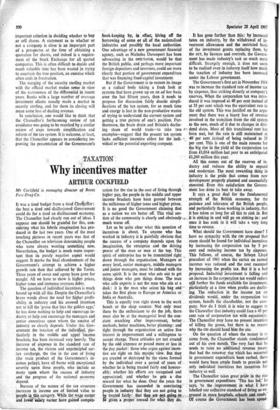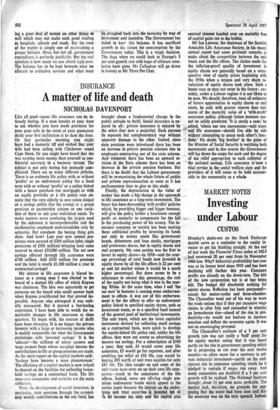Why incentives matter
TAXATION ARTHUR COCKFIELD
Mr Cockfieid is managing director of Boots Pure Drug Co.
It was a tired budget from a tired Chaftcellor: the best a tired and disillusioned Government could do for a tired an disillusioned economy. The Chancellor had clearly run out of ideas. I suppose one should be grateful for this, con- sidering what his febrile imagination has pro- duced in the last two years. One of the most touching pictures in recent years was that of the Chancellor on television denouncing people who were always wanting something new. Nevertheless, the budget is much more impor- tant than its purely negative aspect would suggest. It marks the final abandonment of the Government's attempt te achieve a higher growth rate than that achieved by the Tories. Three years of sweat and agony have gone for naught. All we have to show is higher prices, higher taxes and immense overseas debts.
The question of individual inCentives is much bound up with all this. Despite the Chancellor's brave words about the need for higher profit- ability in industry and his avowed intention not to kill the 'goose that lays the golden eggs,' he has done nothing to help and encourage in- dustry or help and encourage the managers and senior executives upon whom the success of industry so clearly depends. Under this Gov- ernment the taxation of the individual, Par- ticularly in the middle and upper 'incOrne brackets, has been increased very heavily. The increase of sixpence in the standard rate of income tax, the vicious and unprincipled sur- tax surcharge, the rise in the cost of living (the main product of the Government's in- comes policy), have all borne with exceptional severity upon these people, who include so many upon whom the success of industry and the progress of the national economy depend.
Because of the nature of the tax structure increases in income are of limited value to people in this category. While the wage earner _ ind loWel-talatfy earner have gained compen- sation for the rise in the cost of living through higher pay, the people in the middle and upper income brackets have been ground between the millstones of higher taxes and higher prices. It is no good the Government claiming that as a nation we are better off. This vital sec- tion of the community is clearly and obviously much worse off.
Let us be quite clear what this question of incentives is about. To anyone who has worked in industry it is painfully obvious that the success of a company depends upon the imagination, the enterprise and the driving power of the man or men at the top. This spirit of enterprise has to be transmitted right down through the organisation. Managers at every level, senior managers, middle managers and junior managers, must be imbued with the same spirit. It is the man who sets out to get things done who gets things done. The man who sells exports is not the man who sits at a desk: it is the man who seizes his bag and takes the first plane to Europe or America or India or Australia.
This is equally true right down to the work bench or the shop counter. Not only must there be the enthusiasm to do the job, there must also be at the managerial level the con- stant searching after improvement, better methods, better machines, better planning: and right through the organisation an active live interest in improvement and a willingness to accept change. These attitudes are not created by the odd sixpence or pound more or less in the pay packet: those who argue against incen- tive are right on this myopic view. But they are created or destroyed by the views formed by the individual over a period of years of whether he is being treated fairly and honour- ably; whether his efforts are recognised and appreciated; and whether he gets a due reward for what he does. Over the years the Government has succeeded in convincing people in industry that they are not going to betreated fairly: that they are not 80iNt-P a giVen a proper reward for whit they do. It has gone further than this: by increased taxes on industry, by the withdrawal of in- vestment allowances and the restricted basis of the investment grants replacing them, by the SET, by licences and controls, the Govern- ment has made industry's task so much more difficult. Strangely enough, it does not seem to be realised even in industry itself how much the taxation of industry has been increased under the Labour government.
The Government's first act in November 1964 was to increase the standard rate of income tax by sixpence, thus striking directly at company's reserves. When the corporation tax was intro- duced it was imposed at 40 per cent instead of at 35 per cent which was the equivalent rate to the old system. This was justified on the argu- ment that there was a heavy loss of revenue involved in the transition from the old system to the new, much of it due to changes in divi- dend dates. Most of this transitional cost has been met, but the rate is still maintained at 40 per cent instead of being reduced to 35 per cent. This is one of the main reasons for the big rise in the yield of the corporation tax from £1,034 million last year to an anticipated 11,260 million this year.
All this comes out of the reserves of in- dustry and reduces the ability to expand and modernise. The most rewarding thing in industry is the pride that comes from new development properly planned and successfully executed. Even this satisfaction the Govern- ment has done its best to take away.
It says a great deal for the fundamental strength of the British economy, for the patience and tolerance of the British people, and particularly those working in industry, that it has taken so long for all this to sink in. But it is sinking in and will go on sinking in: and once it has sunk in it will take a very long time to reverse.
What should the Government have done? I have no sympathy with the cm proposal that room should be found for individual incentives by increasing the corporation tax by 5 per cent and reducing income tax by sixpence. This follows, of course, the Selwyn Lloyd precedent of 1961 when the surtax on earned incomes was reduced and the cost recouped by increasing the profits tax. But it is a bad proposal. Industrial investment is falling and an increase in the corporation tax would reduce still further the funds available for investment, particularly at a time when profits are declin- ing. The reduction in the income tax on dividends would, , under the corporation tax system, benefit the shareholder, not the com- pany. Nor do I think it is wise to suggest to the Chancellor that industry could face a 45 per cent rate of corporation tax with equanimity. The Chancellor may have no present intention of killing the goose, but there is no reason why the CBI should hand him the axe.
On the question of where the money is to come from, the Chancellor stands condemned out of his own mouth. The very fact that he needs to raise no additional revenue means that had the runaway rise which has occurred in government expenditure been curbed, there would have been ample funds to provide not only individual incentives but incentives for industry as well.
The Chancellor takes great pride in the rise in government expenditure. 'This has led,' be says, `to the improvement in what I have labelled our collective standard of living as ex- pressed in more hospitals, schools and roads.' Of course the Government has been spend-
ing a great deal of money on other things as well which may not make such good reading as hospitals, schools and roads. But the crux of the matter is simply one of maintaining a proper balance. Most, but not all, government expenditure is perfectly justifiable. But the real question is how much we can afford right now. The balance has to be kept between what we allocate to collective services and what must be ploughed back into the economy by way of investment and incentive. The Government has failed to keer this balance. It has sacrificed growth in the future for consumption by the Government today. This is a tragic decision. The days when we could look to Europe's 5 per cent growth rate with hope of ultimate emu- lation have gone. Mr Callaghan will go down in history as Mr Three Per Cent.







































 Previous page
Previous page